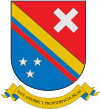San Andres y Providencia
|
Archipelago of San Andrés, Providencia and Santa Catalina Archipiélago de San Andrés, Providencia y Santa Catalina |
|||
|---|---|---|---|
| Department | |||
|
|||
| Motto: Paraíso Turístico Tourist Paradise |
|||
| Anthem: | |||
 San Andrés and Providencia shown in the Caribbean map |
|||
 Topography of the archipelago |
|||
| Coordinates: 12°33′N 81°43′W / 12.550°N 81.717°WCoordinates: 12°33′N 81°43′W / 12.550°N 81.717°W | |||
| Country |
|
||
| Region | Insular Region | ||
| Established | July 4, 1991 | ||
| Capital | North End (San Andrés City) | ||
| Government | |||
| • Governor | Ronald Housni Jaller (2016-2019) (Liberal Party) | ||
| Area | |||
| • Total | 52.5 km2 (20.3 sq mi) | ||
| Area rank | 33rd | ||
| Population (2013) | |||
| • Total | 75,167 | ||
| • Rank | 29th | ||
| • Density | 1,400/km2 (3,700/sq mi) | ||
| Time zone | UTC-05 | ||
| ISO 3166 code | CO-SAP | ||
| Website | Official website | ||
Archipelago of San Andrés, Providencia and Santa Catalina (Spanish: Archipiélago de San Andrés, Providencia y Santa Catalina), or colloquially San Andrés y Providencia, is one of the departments of Colombia. It consists of two island groups about 775 km (482 mi) northwest of mainland Colombia, and eight outlying banks and reefs. The largest island of the archipelago is called San Andrés and its capital is San Andrés.
The name is sometimes abbreviated to "Archip. de San Andres". The official website abbreviates it as San Andrés ("Gobernación de San Andrés").ISO 3166-2:CO lists it as "San Andrés, Providencia y Santa Catalina". Statoids lists it as "San Andrés y Providencia".
Spain formally claimed the archipelago of San Andres and Providencia in 1510, a few years after the Discovery of America by Christopher Colombus. In 1544 the territory was placed under the administration of the Captaincy General of Guatemala. During the early years, Spain concentrated on exploring and colonizing the mainland, and the islands were hardly settled.
In 1630, English Puritans arrived in Providence Island, under the aegis of the Providence Island Company. These Puritans decided to settle this promising tropical island rather than cold, rocky New England, but the Providence Island colony did not succeed in the same way as the Massachusetts Bay Colony. They established slave-worked plantations and engaged in privateering, which led to the capture of the colony by Spain in 1641, who had claimed it a century earlier. In the 1640s, the Puritan-controlled Commonwealth government of England tried to regain the island, but without success. In 1670, English buccaneers led by Henry Morgan took over the islands, which they are connected to the British Mosquito Coast in present-day Nicaragua. The buccaneers and other pirates controlled the islands until 1689. Later Spain regained control of the archipelago, which it held until the independence of Colombia in 1822.
...
Wikipedia


